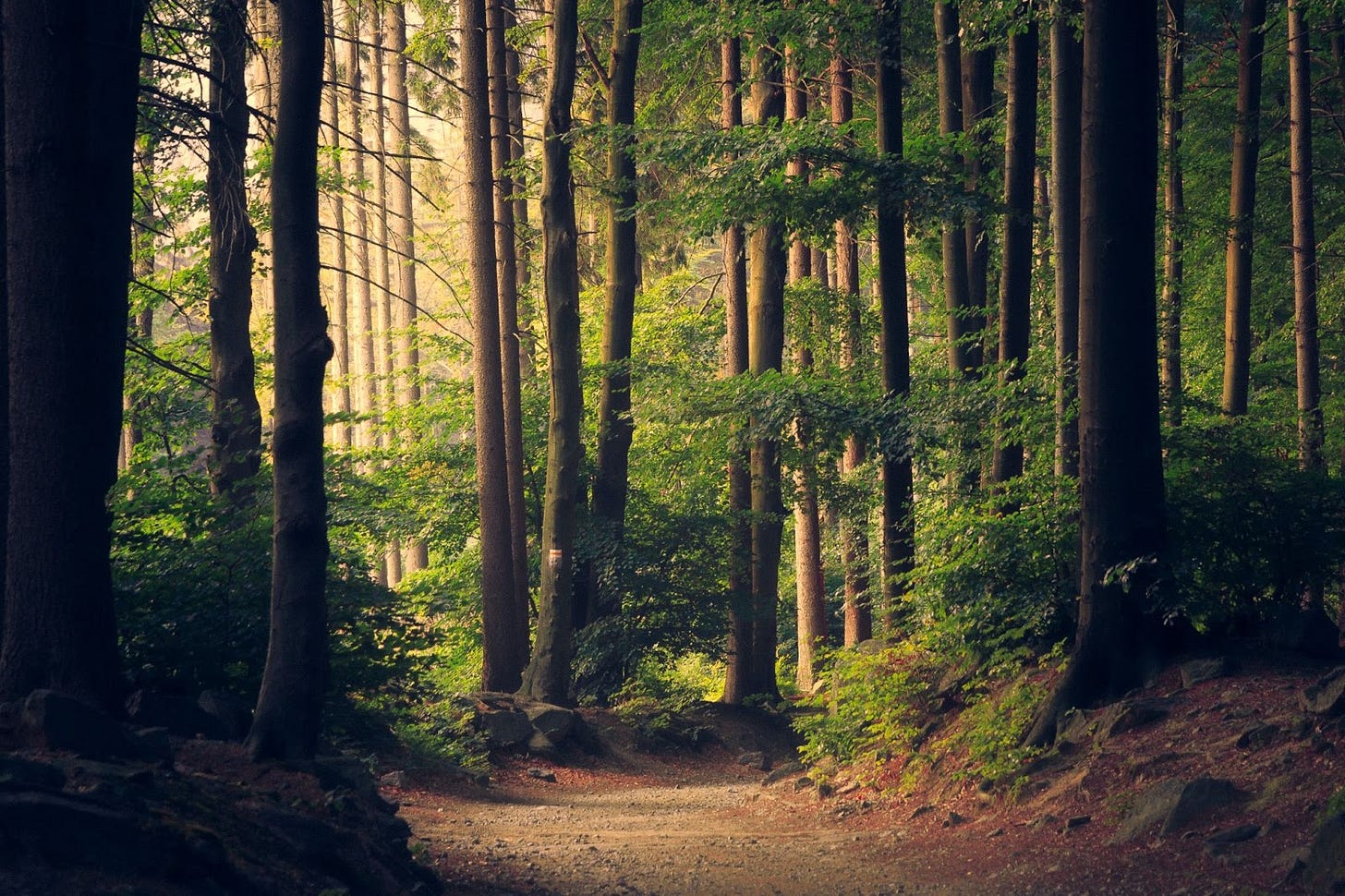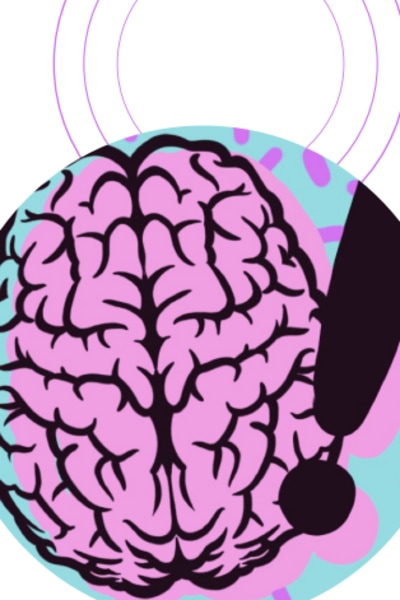How a panic attack opened my eyes
I want to spend next year feeling less helpless and more helpful.
Last week, driving home from a rare errand, I had a panic attack. There wasn’t one specific thing that sparked the event; it was a combination of triggers. I drove past a multi-car accident and multiple emergency vehicles, lights flashing. I visited a very busy and understaffed store, filled with a surprising number of patrons and workers who weren't wearing masks. I heard a story on the radio about the school shooting in Michigan, each new detail more gut-wrenching than the next.
I felt overwhelmed by it all.
On my way home, I noticed all of the things that were wrong: every pothole, every unhoused person, every driver who looked angry or sad. No matter where I looked, the city seemed to be buckling at the seams, crumbling under poor infrastructure—a microcosm of our flawed country. Before I knew it, I was breathing shallowly and rapidly. My hands were sweating, my vision was blurred, and I was struggling to focus on the road ahead of me.
When I made it home, I felt a deep sense of relief. I was finally back in a safe space.
Two days later, I talked about the experience in therapy. My counselor and I have been largely working on processing past traumas—a newsletter topic for another day—but this week, we decided to work through the events leading up to that panic attack and the thoughts I had as a result of it.
I shared how frustrating it was to leave the comfort zone of our house and be greeted with reminder after reminder of how many things that were broken and out of my control. I told her how the experience made me want to rush home, where I felt safe, and how I was embarrassed by that reaction. I explained that I want to interact with the outside world in a more empowered way, with compassion and kindness and the ability to help others—not hindered by panic and fear.
My counselor listened, then offered up an idea.
She invited me to think of myself as a bonfire in a clearing in the woods. She asked me to imagine that when I have more energy, I burn brighter. When I have less energy—when I am tired, ill, or stressed out—my flames dim.
“You have the power to influence everything that’s in your circle of light,” she said. “The things outside of that circle of light—everything that’s in the dark, cold woods—are out of your control.”
She explained that many of us tend to get lost in those woods. We wander around in darkness, looking to control things that we can’t, and get anxious, scared, and overwhelmed as a result.
The trick, she said, is to come back closer to our fire. To focus on the energy we have and the things we can influence.
I told her that, while I’m decent at tending to my fire, I struggle with knowing what I can or can’t control. “I want to be able to fix all sorts of things,” I said. “What’s an example of something that’s in my dark, cold woods?”
“Well, for starters, the infrastructure of Atlanta,” my counselor replied. “At best, you get a vote on these things.”
I couldn’t help but laugh. She was right.
The problem with my drive home wasn’t that I noticed all of the things that were wrong. It was that I let those things overwhelm me instead of considering how I could better respond to them.
I told my counselor that I imagined a future car ride, one with my daughter, when she was old enough to notice and ask about the unhoused people that we passed. What would I say to her?
“If homelessness is something out of my control, what do I do?” I asked. “I don’t want to teach her to turn a blind eye.”
My counselor encouraged me to reframe the situation. Instead of ignoring the problem or feeling overwhelmed by it, I could interrogate my reaction—and I could teach my daughter to do the same.
“Ask yourself how a specific situation makes you feel,” she suggested. “And then ask what you can do with those feelings.”
In other words, instead of wandering the dark woods, I can return to my fire and identify ways I can realistically and positively respond to troubling scenarios. Instead of feeling panicked by the heartbreaking sight of so many unhoused neighbors, I could use that energy to donate to a related cause, research which local candidates are focused on homelessness, or drop off food at my nearby Free99Fridge. Instead of getting lost in my anxiety and feeling helpless, I could take action.
I have spent the majority of this year staying close to my fire. The combination of giving birth and losing my grip on reality at the end of 2020 was scary and life-altering enough that I decided to turn inward, focusing the majority of my energy on taking care of myself, my family, and my mind—which seemed more fragile than ever.
I did this by turning off news notifications, ignoring social media, and continuing to do the things I’d done since the start of the pandemic, like staying home and limiting interactions with others. While these choices were largely good for my mental health, it meant that the glow from my fire stayed pretty small and those dark, cold woods loomed large all around. Throughout 2021, my anxiety remained high. My sphere of influence, relatively low.
A few days after my roadway panic attack, I heard an explanation of what it means to feel overwhelmed that stuck with me. Mindfulness professor Jon Kabat-Zinn describes overwhelm as the perception that life is unfolding at a rate that’s unmanageable for us and our nervous systems. It is our perception—a feeling, not a fact—of how we are coping with any given situation.
During that drive home, I felt overwhelmed. And when things feel unmanageable like that, it’s impossible for me to take action. That’s why it’s crucial to remember that in order to take care of others, I have to continue to take care of myself.
Now, on the cusp of a brand new year—and, yes, another year in the same old pandemic—I want to build my fire back up. I want to expand my glow and identify things I can impact for the better. There are plenty of people, organizations, and problems in the world that could use my support. Likewise, there are plenty of things outside of the sphere of my influence. Going forward, I want to better understand the things I can’t control and embrace the acts I can take.
I already have some specific ideas in mind, things that I’m planning to do mindfully and slowly. And one of those steps involves this newsletter. Starting in 2022, 5% of all subscriber proceeds will go to a different nonprofit or charity each month. This newsletter is something that’s firmly within my sphere of influence, and I’m excited to do even more with it.
I’m eager to be more active in the world next year. But my challenge is to figure out how to do it in a way that doesn’t lead to burnout. I don’t want to lose sight of how to honor my needs.
Right now, I’m optimistic I can find the balance I’m looking for. Next year, I want to spend more time growing my fire and less time getting lost in the woods. I hope you find ways to do the same.
Here’s to the new year. Keep those fires burning, y’all.
xoxo KHG
p.s. What nonprofits or charities should we donate to in 2022? Share your suggestions—along with a short explanation why the organization matters to you—by responding to this email, sending me a message, or writing in the comments.
🎁 The gift of good email
Do you have a sweet, dumb someone in your life? Are you racking your brain for what to give that person? This holiday season, consider giving the gift of a paid My Sweet Dumb Brain subscription to a friend, family member, or colleague you think might enjoy it.
As a reminder, paid subscribers get access to:
Subscriber-only posts and essays
Curated recommendations and resources from your truly
Thoughtful reader replies—stories, advice, and input that make you feel less alone
The ability to post comments on all posts and access the full MSDB archive
A gift subscription is a thoughtful way to share writing that you enjoy with someone close to you. Plus, it helps to support the ongoing work that goes into this publication.
But that’s not all! Newsletter editor Becca put together this cute PDF that you can print and fill out with your gift. If you have any questions about gift subscriptions, just email us.





Therapists have such a good way of making you look at a thing like it was so obvious all along, don’t they? This is full of brilliant advice that I’m already internally groaning about because it’s so much easier to just spiral about all of the things outside of my control and how bad they are. Thank you for the gentle reminders that we can make so much difference closer to home if we focus our energy in the right ways and acknowledge the power we do have.
The Loveland Foundation's Therapy Fund would be a great option for financial support! They provide financial assistance to Black women and girls seeking therapy around the U.S. They pay for a range of 4-12 sessions (depending on what the individual is seeking), and they only work with high quality and culturally competent service providers, too.
https://thelovelandfoundation.org/loveland-therapy-fund/